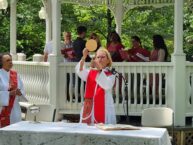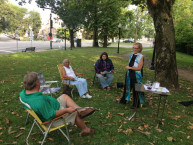 Maundy Thursday – March 24, 2016: May God’s words alone be spoken, may God’s words alone be heard. Amen.
Maundy Thursday – March 24, 2016: May God’s words alone be spoken, may God’s words alone be heard. Amen.
There was a movie along while ago called “Guess Who’s Coming To Dinner?” It premiered in 1967 and featured some wonderful actors – Sidney Portier, Katherine Hepburn, Spencer Tracey to name a few. A young white woman tells her parents she is bringing her fiancé home for dinner, which is all well and good, until he walks in the door and they realize that he is black. Equally surprised were his parents when they met her. Let’s just say there was some tension around the table for both families.
As Christians, this table, the table where we are fed with the body and blood of Christ, is supposed to be something that reminds us all of the universal love of God. But too often, it becomes a place of division. Or perhaps we claim to practice an open table, but we draw the line on who is welcome to it. That is why we sometimes have to loudly proclaim the invitation, so that those who have been pushed aside by the Church will hear us. Because this is a table that reminds us the example Jesus set for us, which we hear tonight.
If the Corinthians had only understood this, we may never have had the passage from St. Paul’s epistle we read tonight, in which he reminds them what this Communion thing is all about. You see, for all their diversity of social strata – free and slave, laborers and the rich, men and women, they forgot the most important thing – that none of those earthly distinctions matter. Instead, they continued the divisions within the walls of that early church community, and St. Paul is having none of it. And neither should we. St. Paul reminds the people of the church in Corinth of the Communion meal, and its meaning, using the words of institution that we still use today.
But before we look down our noses at the Corinthians of Paul’s day, let’s remember just how quickly we as the Christian Church today can sometimes go from this communion meal – a meal of community – a meal in which we experience the real presence of Christ – how quickly from this table we can go out into the world and forget what has happened here, and what it means. In the same way that last Sunday we went from the procession of palms to the cross, is it any wonder that we start the Eucharist with “Hosanna in the Highest,” in the Sanctus and then move on to “On the night Jesus was betrayed…”?[1]
I wonder about that sometimes, and I think it can serve as a reminder of how quickly we forget the meaning of what is given to us in this Eucharist, just as those in Jerusalem went from loving Jesus to calling for his crucifixion.
On Palm Sunday, I spoke about the choices Jesus makes in these last days, and in his life. He chooses to leave the light of prayer to enter into the darkness of that night. He chooses peace over violence during his arrest. And tonight, in his commandment to us, and the example he sets in serving at the feet of his disciples, Jesus shows us another choice – the choice to love and serve others.
Jesus makes no distinction in love. He says, “So if I, your Lord and Teacher, have washed your feet, you also ought to wash one another’s feet. For I have set you an example, that you also should do as I have done to you. Very truly, I tell you, servants are not greater than their master, nor are messengers greater than the one who sent them. If you know these things, you are blessed if you do them.”
Jesus chooses to flip the social distinctions, and he lived that out, not only on this final night with his disciples, but in his entire ministry. You see, around that table, and following Jesus in his ministry, were many of the people living on the margins of that time – tax collectors, poor fisherman, prostitutes, lepers, women, people of other cultures. Everyone is welcome – which, as it does even today – annoys the religious and societal elite. It was a radical hospitality that somewhere along the way got corrupted in Corinth, and somewhere along the way continues to get corrupted to this day.
Jesus calls us to choose a different way.
Maundy Thursday comes from the Latin Mandatum – meaning commandment or mandate. We, the body of Christ today, are called – mandated – commanded – to love. To offer to one another love that is unconditional, love that breaks down boundaries, love that expects nothing in return, love that is born of service and humility. Love that even includes Judas – yes, he was still there – guess who came to dinner! He was still there and Jesus knelt before him to was his feet.
And that is why we welcome everyone here – because Jesus models that choice for us. But more than that, if we are to see Jesus in the eyes of the stranger, the hungry, the poor, those who would betray us, as he taught us in word and in deed, than to do otherwise is to go from this table fed with his sacrifice, only to persecute him in the streets. That, my friends, would be a betrayal of him in as much as the one Judas did so long ago.
We must proclaim the all inclusive love of Christ boldly, by what we say, and what we do. We must model this love in the world, as Jesus did. Because in the end, Jesus made it quite clear what his life, and what his sacrifice on the cross – all of which we celebrate around this table – was to be for us.
It isn’t complicated, but it may not always be easy.
It isn’t expensive, but it will cost us our pride.
It isn’t limited, but will challenge our self-imposed limitations.
It is simply a choice.
The same choice Jesus made.
The same choice he embodied in his life and ministry.
The same choice he modeled for us when he washed the feet of his disciples – that we love and serve everyone at this table, in our neighborhoods, and all around the world.
Fully.
Unconditionally.
Always.
And to do all this in remembrance of him.
Amen.
For the audio, click below (there was a problem, so there are two files – listen to them in order to hear the full homily):
[1] There are more accurate translations of the meaning of that statement, but that is not the point being made here in this homily. For more information, see associated commentaries.
The Rev. Diana L. Wilcox
Christ Church in Bloomfield & Glen Ridge
March 24, 2016
Maundy Thursday – Year C
1st Reading – Exodus 12:1-4, (5-10), 11-14
Psalm 116:1, 10-17
2nd Reading – 1 Corinthians 11:23-26
Gospel – John 13:1-17, 31b-35






